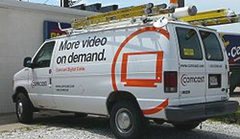
 The New York Times editorial board and Washington Post columnist Steve Pearlstein have accidently shown why we need both blogs and newspapers.
The New York Times editorial board and Washington Post columnist Steve Pearlstein have accidently shown why we need both blogs and newspapers.
Both the Times and Pearlstein said, In separate articles, that the Comcast-NBC Universal merger needed watching but that it could be done with proper regulation. “These concerns might not justify blocking a merger,” said the Times. “But they do justify a careful review.” Namby-pamby stuff by my standards.
As an uppity blogger—without hypercautious Old Media bosses—my response jibes with those of many other Net neutrality advocates. How do we know that consumers will forever enjoy adequate protection? Especially if courts overturn FCC Net neutrality regulations later on? Will Comcast—with 25 million TV subscribers in 39 states—end up favoring its own services on the Net so competitors can’t gain a toehold so easily? How about bandwidth charges associated with Comcast and the rest? New opportunities for discrimination? Also, how about more traditional conflicts such as a potential lessening of opportunities for movie studios, publishers and other suppliers of “content”?
Furthermore, just how eager is Comcast to let consumers unhook themselves from TV and get their entertainment and information from the Net instead? Or keep Net-only prices down, as opposed to inflicting cable channels on the more-or- less unwilling?
There is even an e-book angle here. E-books actually could benefit from Internet television since the same tablets used to enjoy TV programs could display books. HDTV is no small driver of monitor technology. I’m hardly surprised that Pixel Qi is going to design an HDTV; how what about the possibility of WiFi sets?
In fact, WiFi is the preferred technology that Roku boxes use to receive movies and other programs, and later this week, Robert Nagle or I may write about Roku and Netflix as examples of the very kinds of technology that a Comcast-NBC merger could imperil.
From Big Media, the answer would be: Trust the regulators. Obama or not, however, I don’t. The FTC’s failure to fully explore the ramifications of the DRM con—allowing e-stores to “sell” books when actually they’re only renting them in effect and may even yank them away, Amazon-style—is just one more illustration of the failure of the politicians in D.C. to protect us. Oh, and we know how well the SEC safeguarded investors against Bernie Madoff.
Plenty of TeleRead community members will probably disagree with me about Comcast and D.C. Speak up! Just remember that this bloated behemoth is infamous for poor customer service (see the above video, a classic showing a dozing Comcast rep). Do we really need to increase its opportunities for infuriating consumers? Congressional hearings have documented the steady, upward creep of cable fees. The more money spent on Comcast video, the less for e-books and gizmos to read them with.
About the only positive here is that if Washington lets Comcast do the merger, the results could be horrible enough for rivals and governments to step up wireless broadband efforts so we’re less at Comcast’s mercy in the end.
Let me conclude by saying I’m not accusing individual NYT editorial board members or Steve Pearlstein of anything ethically improper—I simply believe that they and those above them are thinking in Old Media Ways. Too bad if they haven’t seen a Roku box, or similar gizmos, in action. Then they might be more aware of the major stakes here, and understand that “No merger” is a much cleaner, safer means of keeping Comcast in check.


































So basically you don’t want this merger because Comcast won’t favor net neutrality and won’t do a good job? When has either of those reasons stopped companies from merging?
And if you were honest you would have mentioned several of the benefits this merger could bring.
They’re already doing it. In Philadelphia, where Comcast owns our hockey and basketball teams, the sports channel that shows nearly all (not just home) games for the Flyers and Sixers, AND most of the Phillies games, is only available to Comcast subscribers. If you choose to subscribe to a satellite service, you can’t get that sports channel. I think Verizon FIOS subscribers can get it. But DirectTV or DishNetwork, forget it.